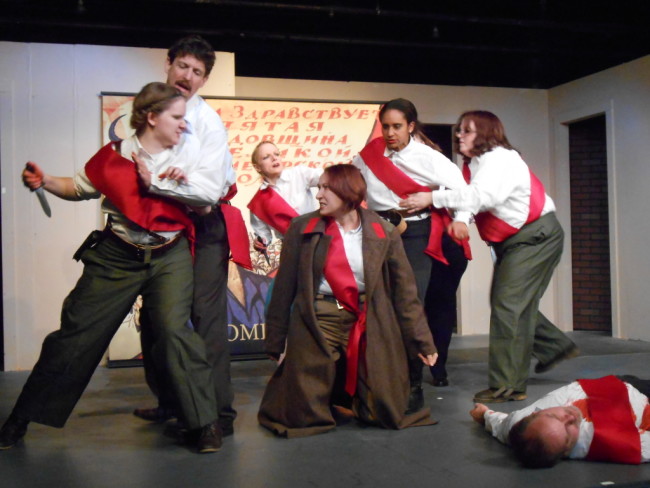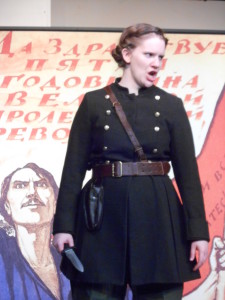Friends! Romans! Washingtonians! The time has come to take a stand against the inconstant shifting nature of theatre in Washington DC! Hail The Rude Mechanicals and their rebellious production of Shakespeare’s Julius Caesar. Directed by company founder Jaki Demarest, this scandalous production takes the great Roman Empire to 1920’s soviet occupied Russia. Stalin, proletariat, rebellion; all encompassed in Demarest’s revolutionary vision of one of the Bard’s milder tragedies.

With honor in one eye and death in the other, Demarest approaches the Bard’s work as a vessel for a political agenda that has run rampant throughout history: power to the people because the people have the power. While the execution of this concept weighs in at a 75% completion factor, the notion that the citizens guide the story arch of the play with their active presence amid the audience is a unique concept inviting the audience to feel as if they are a part of the rebellion. To hear the cries of the citizen right beside your ear as the perpetual struggle for power plays out before your eyes is an immersive technique that fully douses the audience in the idea of revolution.
Demarest layers in the concepts of feminist struggle as well; giving voice and light to the oppression of women by cross-casting all of the major conspirator roles with female actors. Making both Cassius and Mark Antony female characters augments Shakespeare’s undertones of romantic tension between Antony and Caesar as well as the more blatant sexual tension between Cassius and Brutus. Demarest’s ability to adapt a gargantuan Shakespearean tragedy to an intimate space is astounding; her opening scene alone with the V-line of conspirators with Brutus at the point making for a striking first image of the show.

Rounding out the displacement of Ancient Rome into the stoic 1920’s of Russia, Costume Designer Trevor Jones finds outfits most befitting of every gender, class, and rank throughout the performance. Painting Caesar to look like Stalin and his men to wear the red sashes of his regime is a mark of a learned history buff. Jones keeps the style trendy with the cuts of the dresses and coats featured on the women; a classy and sophisticated hand at work when it comes to featuring characters like Cinna of the conspirators or Portia, Brutus’ wife.
Demarest pares down the production from its lengthy original version to something much more succinct. The essence of Caesar might be an appropriate name for the performance, though all of the key points are featured without feeling as if a great deal has been struck from the show’s existence. The production stands on sturdy legs on the whole; exceptional pacing and well-delivered text from the principles.

Metellus (Moira Parham) Cinna (Sam David) Casca (Lisa Hill-Corley) and Trebonius (Melissa Schick) make up the core of the conspirators; each delivering their part in Caesar’s downfall under Brutus’ reign. Whether it’s David’s surly and haughty mockery of the citizens in the opening scene or Hill-Corley’s brutish facial expressions pulled during combat scenes, these four femme fatales become a crucial part of the performance, often just standing stoically still in silence in the company of Brutus. The image that they create as a harem of followers is striking and feeds into the sexual opposition created in Demarest’s vision.

Women for the sake of women, however, are soft and delicate creatures as exhibited in Calpurnia (Mikki Barry) and Portia (Boneza Hanchock.) Mild and meager both Barry and Hanchock adapt the stereotypical demure position of femininity and wend it around Shakespeare’s words when it comes to their husbands. Barry in particularly infuses her performance with hints of a woman’s fury over her outlandish dreams, though never quite so sternly as to evoke the ire of her husband, Caesar (Alan Duda.) To his credit, Duda delivers a forlorn version of Caesar; human and flawed. There is a vulnerability to his portrayal of the title character that is endearing, yet quickly revoked and pinned down by his masculine sensibilities when he puts Calpurnia into her place with a single glance and uttered phrase.

Playing opposite Caesar, though they share precious little stage time together, Demarest takes on the multi-faceted role of Mark Antony. Serving as a bombastic burst of energy to the stage, Demarest finds depth and dimension in this supporting role. A tumultuous amalgamation of spirited sentiment, she churns up a plethora of contradictory emotions, warring with one another throughout her speeches. Fury and love tangle with passionate grievance; several show-stealing moments landing her way when she rallies the crowd to the side of righteousness after the slaughter of Caesar. Jarring in a similar fashion with even fewer moments to the stage is young Octavius (Holly Trout.) Though appearing briefly near the end of the production, her spitfire delivery makes her performance worth noting.

Brutus (Joshua Engel) is often credited with the overthrowing of Caesar; the figurehead to revolution. Yet it’s Cassius (Rebecca Speas) that wields the true blade of villainy in this performance. Engel delivers an underwhelming Brutus; taking a milder and more aloof approach to the character. Emotionally disconnected, Engel serves the role as a puppet; allowing Demarest’s feminist vision of ‘women in power’ to ring true with Speas as the master puppeteer. Engel does rally moments of emotional fury, though the majority of speeches are soft spoken; it’s the romantic tension that he carries between his character and Speas’ that is worth watching.

Speas, as the ruthless and remorseless Cassius, drives the action of the production. A fierce energy with perpetual resting rage-face, Speas is a raging inferno of fury that blasts forth in every scene. Speas’ consistently high-levels of playing each moment at full emotional intensity leaves her little room in which to allow these heavily emotionally articulated moments to grow and in a few scenes she reaches an emotionally peaked ceiling a bit too early. That aside, her stage presence is tremendous and she is the voice and reason of the uprising, masterfully commanding Brutus to her will.
Ye Gods, it shall amaze you, the feats this company manages to accomplish in under two hours traffic upon the stage; a reimagination of tragedy that gives new meaning to power struggles throughout history.
Running Time: Approximately 1 hour and 45 minutes with intermission
Julius Caesar plays its first weekend: January 9 — 11, 2015 at the Greenbelt Arts Center— 123 Centerway in Greenbelt, MD. Tickets can be purchased at this venue by calling the box office at (301) 441-8870 or purchasing them online.
Julius Caesar plays its final two weekends: January 16 — 24, 2015 at the Howard County Center for the Arts— 8510 High Ridge Road in Ellicott City, MD. Tickets can be purchased at this venue at the door or in advance online.

